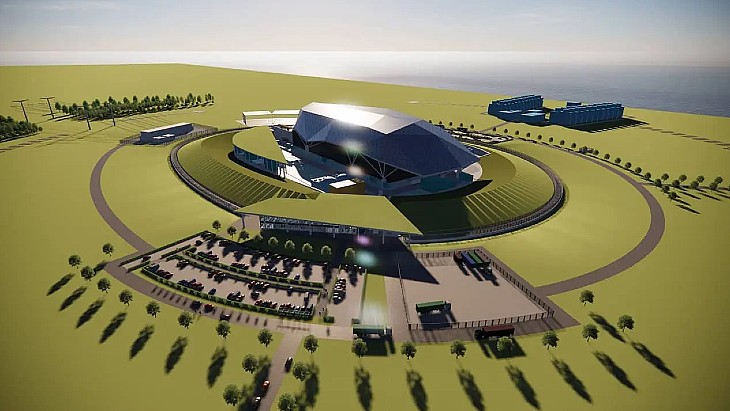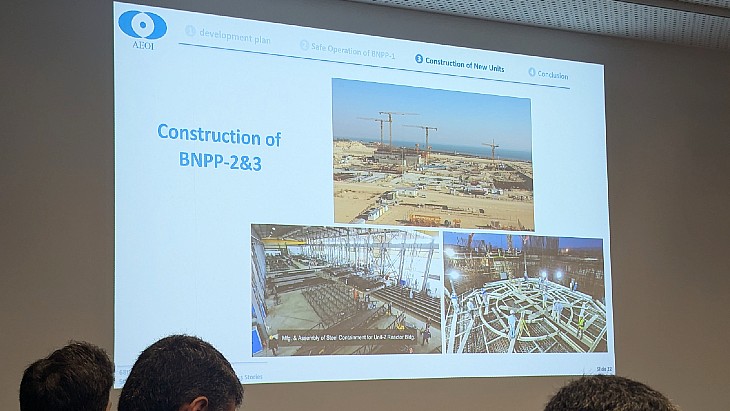French-Italian cooperation to boost Italian steel sector
.jpg)
Through the MoU, the partners will consider co-investment opportunities in new nuclear energy and, in particular, in the construction of small modular reactors (SMRs) in Italy over the coming decade, making use of the SMR technology promoted by EDF, of Edison's expertise, and of the engineering and industrial capabilities of Ansaldo Energia and Ansaldo Nucleare.
They will also explore establishing a supply contract of nuclear energy over the medium and long-term, leveraging primarily on the capacity on the interconnector already operating between Italy and France and thus contributing to the decarbonisation of steel production in Italy.
"Looking at Italy, the reopening of the debate about the use of the new nuclear is considered a decisive step," the partners said in a joint statement. "The goal is to implement an energy transition that, together with the development of renewables and green gas, can rely on a baseload and flexible energy source at fixed costs, allowing decarbonisation targets to be reached while minimising the overall cost of energy."
Antonio Gozzi, president of Federacciai, the Federation of Italian Steel Companies, said: "The agreement signed today is of crucial importance for the Italian steel industry and the entire production chain. The commitment of Italian steelmakers is clear: we intend to lead the transition to a fully sustainable steel industry. Thanks to agreements like this, within a few years, Italy can become the first country in the world to produce fully decarbonised steel.
"Nuclear power will be a strategic and much needed component in achieving such ambitious goals, providing the industry with a secure and environmentally friendly energy supply. We will work to ensure that this first important agreement can set an example for all hard-to-abate industrial sectors: this is the only viable way to meet the most ambitious decarbonisation targets."
"This new step in French-Italian cooperation in the field of decarbonised electricity generation from nuclear sources highlights EDF's strong commitment to establishing and consolidating a long-term relationship," added Xavier Ursat, EDF Group Senior Executive Vice President in charge of Strategy, Technologies, Innovation and Development. "Our aim is clearly to support the relaunch of the nuclear option in Italy and to strengthen industrial cooperation between the two countries in Italy, in France and in Europe."
"The interest of a key player such as Federacciai confirms and reinforces our strategy of collaborating with companies and business associations from energy-intensive industries to promote concrete actions aimed at achieving European climate targets," said Marc Benayoun, EDF Group Senior Executive Vice President, in charge of Customers & Energy Services.
Nicola Monti, CEO of EDF's Italian subsidiary Edison, said the new agreement marks further progress in setting an agenda for developing new nuclear energy in Italy. "Today, Italy imports about 15-20% of its energy from abroad. The development of a national supply chain for the production of new nuclear energy, making the most of the technological advances of recent years and investing in the improvement of local skills, represents a phenomenal opportunity to achieve not only decarbonisation targets, but also greater independence and security for the country's energy system."
"This agreement allows Ansaldo Nucleare to make available its experience and capabilities as a systems integrator and developer of new nuclear technologies and represents a crucial opportunity for the country's growth," added Ansaldo Nucleare CEO Daniela Gentile. "The Italian industry recognises the importance of a European approach in the nuclear sector and, as part of the Ansaldo Energia Group, we hope that this will result in the implementation of Italian nuclear projects over the next ten years."
Return to nuclear
Italy operated a total of four nuclear power plants starting in the early 1960s but decided to phase out nuclear power in a referendum that followed the 1986 Chernobyl accident. It closed its last two operating plants, Caorso and Trino Vercellese, in 1990.
In late March 2011, following the Fukushima Daiichi accident, the Italian government approved a moratorium of at least one year on construction of nuclear power plants in the country, which had been looking to restart its long-abandoned nuclear programme.
In May last year, the Italian Parliament approved a motion to urge the government to consider incorporating nuclear power into the country's energy mix.
Italy's government included potential new nuclear capacity in its National Integrated Energy and Climate Plan, which was submitted to the European Commission on 1 July.
Speaking the following day at the Global Energy Transition Congress in Milan, Italy's Minister for Environment and Energy Security, Gilberto Pichetto Fratin, said: We expect to be able to reach about 8 GW from nuclear power by 2050, covering more than 10% of the nation's electricity demand. This percentage may increase to over 20-22% by fully exploiting the potential of nuclear power in our country."
_92619.jpg)

_84504.jpg)






_66488.jpg)


